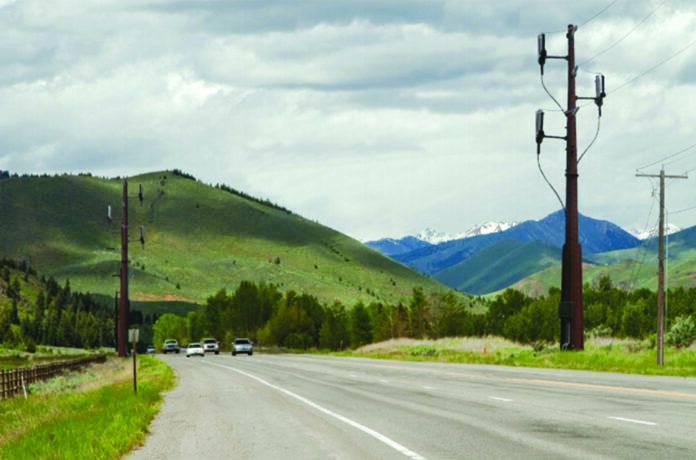
Tidwell et al to sue county
By Eric Valentine
Idaho Power’s plan to develop a backup power system along Highway 75 may have passed initial muster with Blaine County commissioners, but it’s the courthouse that may ultimately determine the project’s destiny.
Blaine County resident Kiki Tidwell, a longtime green-energy advocate, says she will be suing the county for what she says is its failure to follow its own rules. Specifically, Tidwell claims the county’s Local Land Use Planning Act prohibits them from altering the original permit which approved Idaho Power’s backup power line so long as it would be installed 100% underground. In an interview with “Wood River Weekly,” Tidwell said former Hailey mayor Fritz Haemmerle will be the attorney representing her, and other residents and property owners may join the lawsuit.
“We’ll see who else is going to participate,” Tidwell said. “What needs to happen is for the county and Idaho Power to hash out in front of the PUC (Public Utilities Commission) exactly who is supposed to pay for what.”
Meanwhile, county officials from its commissioners to its legal staff believe they have dotted all the Is and crossed all the Ts when it comes to the matter. Commissioners voted unanimously on Feb. 9 to have staff give one final review (called a findings of fact) of Idaho Power’s latest game plan for the power line project that will cost local ratepayers north of $20 million to be paid off over the next 20 years in the form of rate increases and surcharges. And the kicker? Part of the project is going to go above ground anyway.
“You’re waving the white flag,” said Haemmerle at the Feb. 9 meeting. “You haven’t even taken your best shot yet.”
The “shot” Haemmerle says is to ask the PUC to determine whether Idaho Power or local ratepayers are on the hook for the bill. County staff attorney Tim Graves was clear that the payment plan in front of the commissioners is exactly what the PUC would determine is fair to all parties. Haemmerle and Tidwell have been openly disputing that and feel stakeholders from the county and the utility are assuming how the PUC would decide rather than testing the waters themselves.
“One party (Idaho Power) has a financial incentive to not hash it out,” Tidwell said.
What’s clear is that local ratepayers have to cover the difference in costs of improvement projects like these when they are asking for something (undergrounding) that go above and beyond the basics. However, it was Idaho Power’s idea to create the redundant power line, and to do it with transmission lines and distribution lines 100% above ground. Since Highway 75 is not only a scenic corridor but one that leads to the Valley’s economic life blood (Sun Valley), undergrounding becomes more of a basic necessity than it does an extravagance.
“It’s the worst of both worlds,” Tidwell said regarding the current plan. “We’re impacting a scenic corridor and we’re being forced to pay for it.”
“They’re bullying you,” added Haemmerle regarding Idaho Power’s option of having the poles 100% above ground.
Are We Pulling a Texas?
For either side of the issue, the importance of having an adequate redundancy (power line backup) couldn’t be more clear after the recent snowstorm events in Texas. Without trying to litigate how citizens of the Lone Star State found themselves in the fatal mess they were in and, sans the Ted Cruz Cancún-gate controversy, it’s important for a community to know whether the weather can put them in a similar situation where power failures lead to food and water shortages and hypothermic conditions inside homes.
Again, this is where stakeholders in the county and at the power utility differ from folks like Tidwell. The ideal solution in Tidwell’s opinion? Forget about undergrounding power lines just yards away from the existing power lines. Instead, invest money into backup generators at the local substations.
“We are completely dependent on power that is delivered to us from a long ways away,” Tidwell said. “ We need to have distribution backed up next to where we live.”
5G
Other concerns from the public involved the installation of 5G equipment on the new, larger power poles. While there certainly is more room to hold 5G equipment, Idaho Power said there are no pending requests to install 5G transmitters at this time on the proposed power poles.
Idaho Power says the telecom company seeking 5G deployment has to show its permission and authorization to do so from the local jurisdiction. Approval of the transmission line project would not automatically authorize a whole host of 5G fixtures, Idaho Power says.


